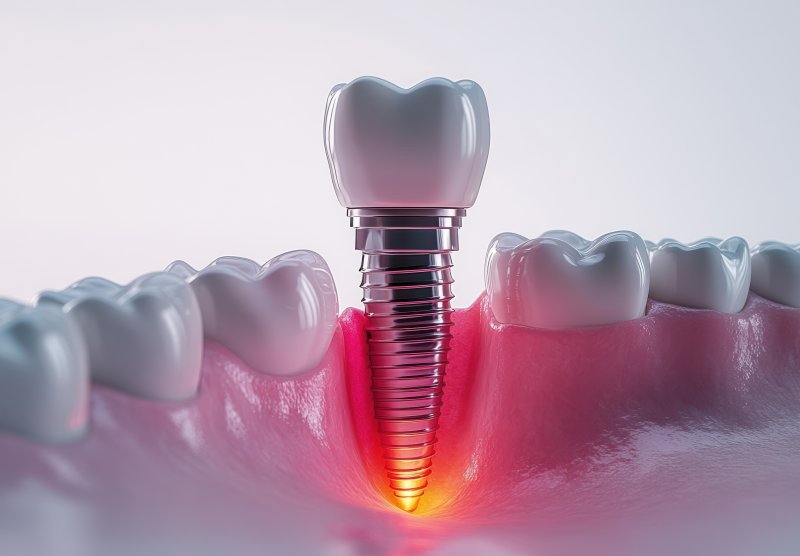
Dental implant placement is known for having a high success rate of about 95 percent, so the chances of a problem occurring remain low. However, it’s not impossible. Although dentists and specialists encourage optimal oral hygiene, a healthy diet, and giving up undesirable habits (i.e., smoking, eating ice, etc.), problems can arise that lead to dental implant failure. Keep reading to discover what signs indicate a serious issue and how you can avoid this situation from the start.
What Causes Dental Implant Failure?
Dental implants need a healthy environment to successfully integrate and thrive. Without it, the risk of failure increases dramatically. Some of the most common reasons for a failed dental implant include:
- Peri-implantitis: A similar form of gum disease that occurs when bacteria and infection damage the gums surrounding the implant. This usually develops as a result of poor oral hygiene.
- Unhealthy Habits: Poor lifestyle habits, specifically, smoking, can lead to implant failure. The contents found within cigarettes, cigars, and other tobacco products suppress the immune system, making it difficult for the implant to fuse with the bone during osseointegration.
- Lack of Jawbone Density: Without a dense jawbone, implants have virtually nothing to fuse with. This creates an unstable environment for the implant, causing it to ultimately fail.
- Autoimmune Disease: Certain medical conditions (i.e., diabetes) or autoimmune diseases can prevent osseointegration, making it impossible for the implant to establish itself within the jawbone and create a solid foundation for new teeth.
How Can You Know When a Dental Implant Has Failed?
You may not know if your implant has failed unless you know what signs to look for, which include:
- Difficulty chewing
- Increased swelling around the implant
- Increased pain near the implant
- Implant feels loose
- Gum recession
What Kind of Treatment is Available?
Prosthodontists and other specialists refer to it as dental implant salvage – a form of treatment designed to repair a failed implant post.
Depending on the severity of the problem and the reason for failure, an appropriate treatment plan will be crafted to ensure your smile’s future. Potential recommended services include gum disease treatment, antibiotics, bone grafting, and other similar infection control options.
How Can You Avoid Dental Implant Failure?
Dental implant failure doesn’t have to be your reality; in fact, there are plenty of ways to avoid this problem altogether. Whether you recently received your new smile or have been enjoying it for many years, you can:
- Practice good oral hygiene at home by brushing your teeth twice daily for two minutes, flossing at least once a day, and rinsing accordingly.
- Maintain regular dental checkups and cleanings with your dentist.
- Wear appropriate mouth protection while engaging in physical activity (i.e., sports) or if you struggle with bruxism (teeth grinding).
- Adopt a healthy, nutrient-rich diet that minimizes sugars and starches.
Knowing what to look for when living with dental implants can save you a lot of time and discomfort should you develop a problem along the way. However, if you want to keep your new smile in check for years to come, consider adopting these preventive strategies to minimize your risk of implant failure.
About the Practice
Boston Prosthodontics Dental Group consists of four board-certified prosthodontists and a board-certified periodontist who possess years of experience and knowledge, delivering world-class care to patients throughout the U.S. and beyond. As a respected and well-known dental practice – one that is recognized globally – we believe in providing concierge-level care so that patients experiencing tooth loss can smile confidently once again.
When experiencing dental implant failure, individuals can expect nothing but the best from our team of professionals, as we will restore and rebuild a person’s smile, so it looks and feels brand-new. If you’re unsure whether you’re dealing with a failed dental implant, visit our website or call (617) 523-5451.
